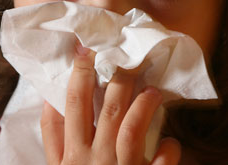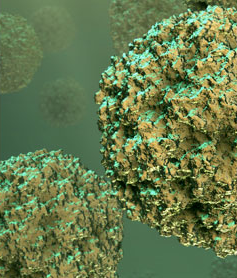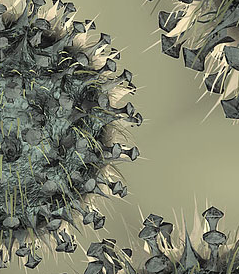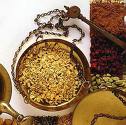You can get a flu jab but the flu virus mutates, added to which antibiotics don’t work – so what can you do to lessen your chance of being ill this winter?

First and foremost you should look after your general health by eating fresh and healthy food, taking exercise and be getting sufficient sleep.

Common Cold virus

One of the many strains of the flu virus
But here are some specific actions you can take to cut your risk:
Good hygiene
1. Avoid close contact with people who are already ill – that including shaking hands!
2. Don’t spread your germs to others. Cover your mouth and nose with a tissue when coughing or sneezing.
3. Don’t under-estimate the importance of washing your hands. Use soap and water or an anti-bacterial cleanser
4. . Germs are often spread when a person touches something that is contaminated with germs and then touches his or her eyes, nose, or mouth.
5. Clean surfaces at home, work or school, especially when someone is ill.
Treatment is largely limited to alleviation of symptoms, with generally helpful measures such as:
- Relieve nasal congestion: Use saline (salt water) drops, 1 teaspoon of salt to 1 quart of water
- Relieve chest congestion: Inhale steam from a pan of boiled water for 15 minutes every 2-4 hours or take a long hot shower and inhale the steam
- Relieving sore throat: In 8-ounces (236 mL) of warm water, dissolve 2 aspirin tablets (325 mg each) and 1 teaspoon (5 ccs) of salt. Gargle for 5 minutes and spit it out (do not drink it).
- Get rid of lung congestion: Use an ultrasonic, cool-mist humidifier and drink warm teas and water.
- Cough up mucous
- If you think you have a fever check with your doctor
- Get plenty of bedrest to minimise aches and pains.
- Keep hydrated: Drink 8 ounces (236 mL) of water every hour while awake (more if you have a fever), in which you have added 2 tablespoons (30 ccs) of freshly squeezed lemon juice (for added flavonoids and to help alkalinize the body).
- Consider natural antiviral compounds:
Flu-fighting supplements
Vitamin C
Vitamin C taken in a strength between1000-6000 mg/day may help to shorten the length of colds and flu. Various studies have found that taking vitamin C helps to reduce cold symptoms and help fight the infection.
Vitamin D
Vitamin D is now seen as one of the most potent anti-oxidants. And since most flu epidemics occur during the winter when there is less sunlight to help our bodies make this important vitamin it may help to take a supplement. Several animal studies support the theory that vitamin D prevents the flu.
Selenium
Selenium is also a potent antioxidant. It is helpful across a range of inflammatory or infectious diseases including the flu.
Green tea
Green tea polyphenol antioxidants stimulate the production of several immune system cells, and possess antibacterial properties. So drinking green tea may also be a key flu-fighting strategy. Research reveals that drinking green tea particularly stimulates gamma-delta T-cells that boost immunity against viruses. Furthermore, a substance in green tea called L-theanine causes T cells to secrete 10-times their normal output of the virus-fighting interferon.
Glutathione
Glutathione is a tripeptide made of the three amino acids glycine, glutamic acid (glutamate), and cysteine. Glutathione has been called the “master antioxidant.” It is also able to refresh and recycle other antioxidants such as vitamins C and E. Results of several studies suggest that glutathione has antiviral properties and inhibits activation and replication of the influenza virus. One study also reported that glutathione could help prevent infection by the influenza virus if administered directly to the tissues lining the mouth and upper airway. The scientists suggested that glutathione concentrated in a lozenge or spray might be the most effective way to use the compound as a flu preventive.
Probiotics
Probiotics contain live microorganisms, which colonize the intestines and help to prevent intestinal infections. Lactic acid bacteria, such as Lactobacillus acidophilus, are the most commonly used “friendly” strains of bacteria used in probiotic products. Their important action is helping to boost the immune system and reduce the incidence of one or more episodes of the common cold.
Some flu-fighters to try here:



